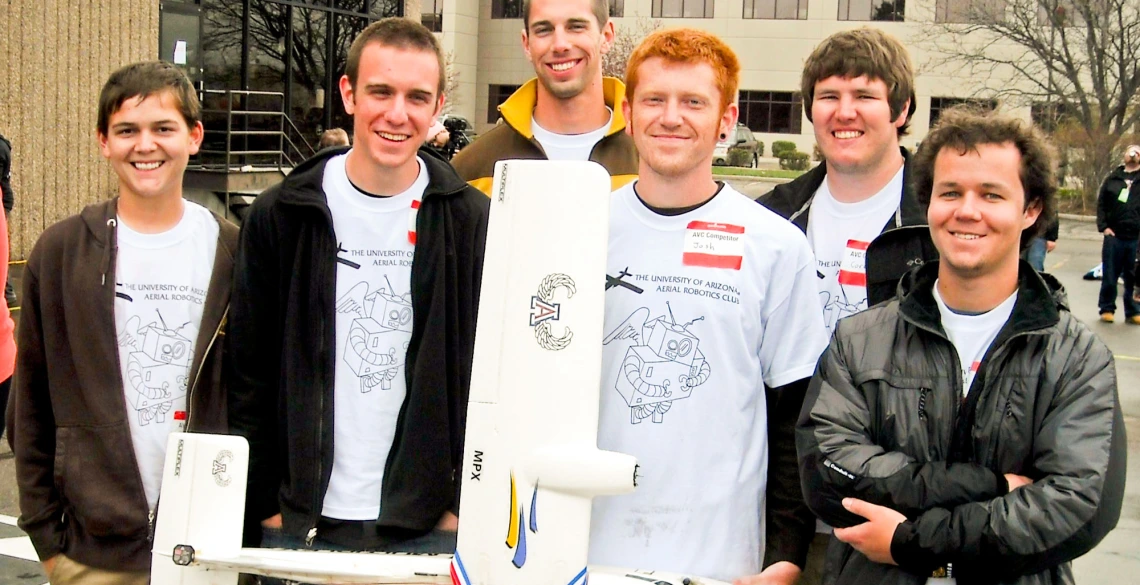UA Aerial Robotics Club Wins Engineering Award at National Competition
Flying robot team amazes judges with autonomous aerial performance.

Aerial Robotics Club team members display their robotic plane at the SparkFun competition in April 2010. Left to right: Josh Alexander, Ed Baker, Chris Poole, Josh Tolliver, Cory Pearman, and John Harper.
The UA Aerial Robotics Club won the Engineers Choice Award at a recent national competition.
The ARC was competing in the second annual SparkFun Autonomous Vehicle Competition organized April 17 by SparkFun Electronics at its headquarters in Boulder, Colo.
The award was made by the organizers in recognition of the high standard of engineering evident in the design of ARC's autonomous aircraft.
Hands Off
The team's Twinstar plane completed three completely autonomous aerial circuits of the SparkFun building. Autonomous means that the robotic aircraft navigated under its own control with no human interaction. It could not receive any commands via any medium from a human operator and was not allowed to transmit information.
The UA team was the first of only two teams to autonomously take off, fly the course and land autonomously in a target landing zone; the team also flew the course at a lower altitude than the other teams, which earned them a low-altitude bonus.
The SparkFun website reported that "the University of Arizona robotics team nailed an amazing autonomous landing, coming to rest right on top of the finish line."
The event attracted 20 teams and approximately 400 spectators, but only eight teams completed the three circuits. "I was genuinely amazed at the quality of the competitors this year," SparkFun engineer Ryan Owens said. "Last year's event was good, but this year's blew it out of the water."
"We're really pleased with the award," said Cory Pearman, ARC team member and mechanical engineering senior. "We placed third overall in terms of speed, but we had the best engineered vehicle, and that's more important."
Eyes On and In the Future
The team may profess to be happy with their superior engineering, but they still intend to build a faster plane for next year's competition. They will also add several new high-tech features.
"Next year we'll take what we have and develop and perfect it," said Ed Baker, ARC team member and electrical engineering senior. "We are going to add vision. We'll add a camera and some software so the vehicle can see where it is going."
The continual development of the flying robot is what being in the ARC is all about, said club member John Harper, who is a mechanical engineering senior. "No one knows anything about UAVs when they come to UA and join the club," Harper said. "That's the point of the club."
Pearman agreed: "We are building planes all the time," he said. "We build trainer planes for new members, and we also crash a lot of planes." Crashing is part of flying for this club, and is actually a good thing. "So many people get involved in rebuilding crashed planes that the knowledge base goes way up," said Pearman.
Club Support
The team's adviser is professor Hermann Fasel, and ARC members readily acknowledge his guidance and support. "Without Dr. Fasel's support, none of this would have been possible," said Baker. "The labs in aerospace and mechanical engineering allow the club to fully explore new concepts, directions, and ideas. Being in this club forms a foundation for our educations as well as our future careers."
Pearman, Baker and Harper all graduate in 2010, and their main concern is recruiting new members and maintaining that knowledge base within the club. Expect lots more crashes over the summer.
SparkFun Electronics was founded in 2003 by CEO Nathan Seidle, then an engineering student at the University of Colorado, Boulder. He realized while working on a class project just how difficult it was to get parts to make an electronics prototype come to life, so he set up SparkFun.
In June 2009 the company was named one of the top 50 Colorado companies to watch by the Colorado Office of Economic Development and International Trade.

